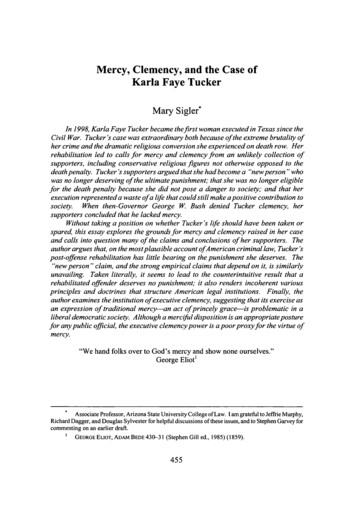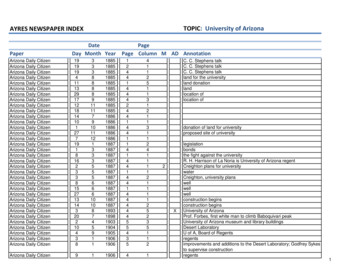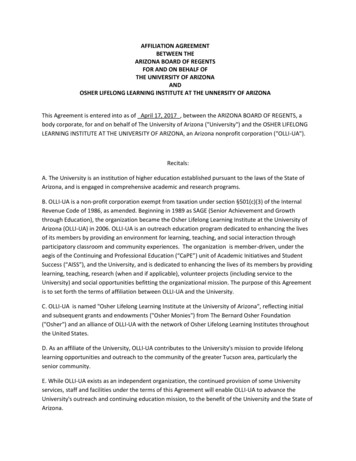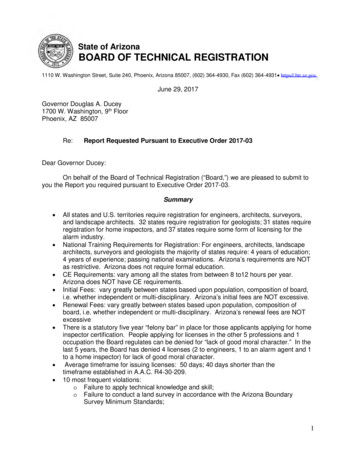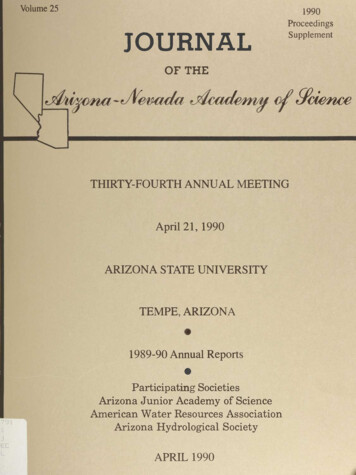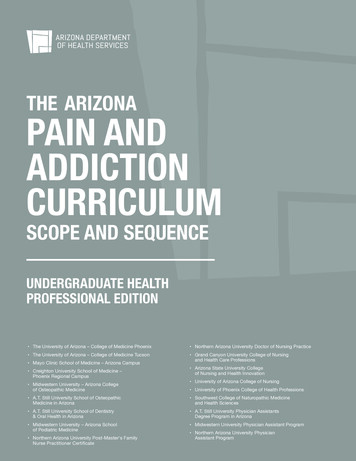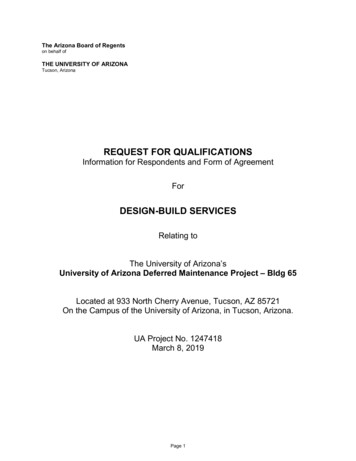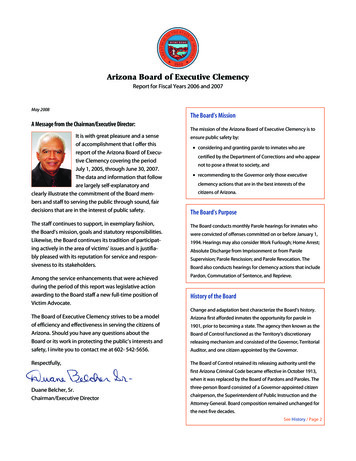
Transcription
Arizona Board of Executive ClemencyReport for Fiscal Years 2006 and 2007May 2008The Board’s MissionA Message from the Chairman/Executive Director:It is with great pleasure and a senseof accomplishment that I offer thisreport of the Arizona Board of Executive Clemency covering the periodJuly 1, 2005, through June 30, 2007.The data and information that followare largely self-explanatory andclearly illustrate the commitment of the Board members and staff to serving the public through sound, fairdecisions that are in the interest of public safety.The staff continues to support, in exemplary fashion,the Board’s mission, goals and statutory responsibilities.Likewise, the Board continues its tradition of participating actively in the area of victims’ issues and is justifiably pleased with its reputation for service and responsiveness to its stakeholders.Among the service enhancements that were achievedduring the period of this report was legislative actionawarding to the Board staff a new full-time position ofVictim Advocate.The mission of the Arizona Board of Executive Clemency is toensure public safety by: considering and granting parole to inmates who arecertified by the Department of Corrections and who appearnot to pose a threat to society, and recommending to the Governor only those executiveclemency actions that are in the best interests of thecitizens of Arizona.The Board’s PurposeThe Board conducts monthly Parole hearings for inmates whowere convicted of offenses committed on or before January 1,1994. Hearings may also consider Work Furlough; Home Arrest;Absolute Discharge from Imprisonment or from ParoleSupervision; Parole Rescission; and Parole Revocation. TheBoard also conducts hearings for clemency actions that includePardon, Commutation of Sentence, and Reprieve.History of the BoardChange and adaptation best characterize the Board’s history.The Board of Executive Clemency strives to be a modelof efficiency and effectiveness in serving the citizens ofArizona. Should you have any questions about theBoard or its work in protecting the public’s interests andsafety, I invite you to contact me at 602- 542-5656.Arizona first afforded inmates the opportunity for parole inRespectfully,The Board of Control retained its releasing authority until the1901, prior to becoming a state. The agency then known as theBoard of Control functioned as the Territory’s discretionaryreleasing mechanism and consisted of the Governor, TerritorialAuditor, and one citizen appointed by the Governor.first Arizona Criminal Code became effective in October 1913,when it was replaced by the Board of Pardons and Paroles. TheDuane Belcher, Sr.Chairman/Executive Directorthree-person Board consisted of a Governor-appointed citizenchairperson, the Superintendent of Public Instruction and theAttorney General. Board composition remained unchanged forthe next five decades.See History / Page 2
Types of Board HearingsHistory / from Page 1General Parole (A.R.S. § 31-412[A]) A conditional release fromIn 1966, the Legislature expanded Board membership to fiveincarceration that entitles the parolee to serve the remainder of thepart-time members appointed by the Governor to five-yearparolee’s term outside of the confines of a penal institution, if theterms. Two years later, legislation replaced the five part-timeparolee satisfactorily complies with all of the terms and conditionsmembers with three full-time members. The Governor ap-provided in the parole order.pointed all members to three-year terms, subject to Senateconfirmation.Parole to a Consecutive Sentence or Another Jurisdiction (A.R.S.§ 31-412.B) A mechanism to parole an inmate to a consecutiveIn 1978, as part of the new Criminal Code, the Legislaturesentence to be served in an institution or parole to another jurisdic-expanded the Board to five full-time members serving five-yeartion.terms, with gubernatorial appointments remaining subject toSenate confirmation. In 1984, the Legislature further expandedEarly Parole (A.R.S. §41-1604.11[K]) A conditional release fromthe Board to seven full-time members.incarceration before the inmate has reached his or her generalparole eligibility date. This type of release consideration is usedThe 1993 Legislative session included legislation that eliminatedwhen there is a lack of bed space in the Department of Corrections’all Board releases for inmates whose offenses were committedinstitutions. An inmate eligible for release under this statute may beafter January 1, 1994, and changed the agency’s name to theconsidered for parole, home arrest or work furlough.Board of Executive Clemency.Home Arrest (A.R.S. § 41-1604.13) A program for inmates who areIn 1997, the Board’s membership was decreased from seven toeligible to complete their prison sentence in the community. Thefive. That change became effective in January 1998.Home Arrest program is a restrictive program that uses activeelectronic monitoring surveillance and the supervision of a HomeArizona Revised Statutes § 31-401 and subsequent sections detailArrest officer. A person in the Home Arrest program is under inmatethe Board’s operating authority and duties.status and subject to all of the rules and regulations of the Department of Corrections. Except for authorized movements out of the§31-402, the Governor may grant a reprieve only upon recommen-residence, such as employment and mandated treatment program-dation of the Board.ming, the inmate is confined to his residence.Commutation of Sentence (A.R.S. §§ 13-603[L], 31-402, 31-403, 31Work Furlough (A.R.S. § 41-1604.11) A release from prison thatallows the inmate to maintain gainful employment and pay restitution to the victim of the inmate’s offense.411[H], 31-411[I][1], and 38-431.01) A change or modification of asentence imposed by the court. The Board assumes that sentencesimposed by the court are fair and correct; however, either by Judi-Absolute Discharge (A.R.S. §§ 31-411 and -414) The Board maycial request or by inmate application, the Board may find mitigatingdischarge a person from imprisonment (-411) or parole supervisioncircumstances under which justice would be better served if a(-414) prior to the sentence expiration date or prior to the expirationcommutation were recommended to the Governor. Pursuant toof parole. Community Corrections (a division of the Department ofA.R.S. § 31-402, the Governor may grant a commutation of sentenceCorrections) may recommend a parolee for an absolute discharge toonly upon recommendation of the Board.the Board because of his/her exceptional performance while underparole supervision.Rescission Withdrawal of an action previously granted by the Boardbefore the inmate actually enters the action status.Pardon (A.R.S. §§ 31-441 through -446) An act of grace by theGovernor that absolves the convicted felon of the legal conse-Revocation (A.R.S. §§ 31-415 through 31-417) Withdrawal of anquences of his or her crime and conviction. Pursuant to A.R.S. § 31-action previously granted by the Board after the inmate has entered402, the Governor cannot grant a pardon unless the Board has firstthe action status.recommended it.Modification A hearing held to determine if conditions of releaseReprieve (A.R.S. §§ 31-443 through 31-446) A delay or temporaryshould be modified or changed. A modification hearing is usuallysuspension of the carrying out of punishment. Pursuant to A.R.S.held at the request of a Parole Officer.2
Board MembersDuane Belcher, Sr. (Tucson) is the Board’s Chairman/ExecutiveDirector. A Tucson resident, Mr. Belcher brings to the Board over 32years of experience in the criminal justice field. He has served as theBoard’s Chairman/Executive Director since 2004, when the Legislature combined the two positions. He was reappointed by GovernorNapolitano to the Board in 2006.Mr. Belcher was initially appointed to the Board in September1992 by Governor Symington and served two terms until April 2002.He also served as Chairman from September 1993 until February1997.After receiving his Bachelor of Science degree in 1971 fromCentral State University in Wilberforce, Ohio, Mr. Belcher worked asa probation/parole officer in the Cleveland area until he relocated toArizona in 1980 to become a correctional service officer. He waspromoted through the ranks to his last Department of Correctionsposition as the supervisor of the Home Arrest program.Mr. Belcher is a member of the National Association of Blacks inCriminal Justice; the Arizona Probation, Parole & Corrections Association; American Correctional Association; and the Association forParoling Authorities International.He frequently speaks to community groups about the Board ofExecutive Clemency and his experiences in the Criminal Justice field.Olivia V. Meza (Tempe) was appointed by Governor Napolitanoto the Board in February 2004.Ms. Meza has 30 years experience with the criminal justice system as a senior federal court executive, a specialist in Indian Countryand sex offenses, a pretrial services officer, and a probation officer inArizona, Maryland and California. Ms. Meza served as Chief of Pretrial Services for the U.S. District Court in Arizona, one of the largestand fastest growing offices nationally. She administered a multimillion dollar budget and managed 60 supervisors and officers statewide, working directly with federal judges, U.S. Attorney, victimsand families, and defendants. She introduced cutting-edge softwarefor supervision of federal defendants charged with computer-basedsex offenses and developed leadership training programs and professional staff development.The Yuma native served as a juvenile probation officer in Maricopa and Yuma Counties and taught at Arizona Western College.She has volunteered with Maricopa County Justice Courts as a mediator and assisted at the Chrysalis shelter for Victims of DomesticViolence, the Society of St. Vincent de Paul, and the Salvation Army.She formerly served on the Ninth Circuit Judicial Committee onEmployee Diversity.Ms. Meza is a member of the Arizona Dispute Resolution Association and the National Hispanic Leadership Institute and attendedleadership academies at the Center for Creative Leadership, theKennedy School of Government at Harvard, and the Gallup Institute.At Arizona State University she earned a Masters of Science degreein Family Life and Child Development and a Bachelor of Sciencedegree in Sociology.Leonard Tad Roberts (Casa Grande) was appointed to theBoard in 2005 by Governor Napolitano. Before serving as a teacher/coordinator for the Casa Grande Elementary School District (MiddleSchool Alternative Education Program) from 1995 to 2005, Mr. Roberts worked for more than 20 years in the criminal justice/probationfield. He is a former Pinal County Juvenile Probation Training Officerand a former Maricopa County Adult Probation Officer.Prior to moving to Arizona, he worked for the Monterey County,California, Superior Court in a number of capacities, including probation counselor, probation officer and pre-release officer.Marian M. Yim, Leonard Tad Roberts, Ellen Stenson, Olivia V. Meza(Seated) Duane Belcher, Sr.Mr. Roberts is a board member of the Casa Grande Sunrise Optimist Club. His education includes a bachelor’s degree with dualmajors in psychology and minority relations from Sonoma StateCollege in California and a master’s degree in education, with anemphasis on counseling, from Northern Arizona University.Marian M. Yim (Phoenix) was appointed to the Board by Governor Napolitano in 2006. She is an attorney with more than 20 yearsof public law experience. She was an Assistant Attorney General for13 years, prosecuting child-support and white-collar criminal cases.As a staff attorney she assisted the Arizona Supreme Court on criminal and civil appeals.Prior to this appointment Ms. Yim was Counsel to the Mayorand Deputy City Attorney for the City of Phoenix. She was also anAdjunct Professor of Professional Responsibility at the Arizona StateUniversity College of Law.An Oregon native and an Arizona resident since 1982, Ms. Yimhas volunteered as a member of many community and professionalorganizations, including the Arizona Supreme Court Commission onJuvenile Justice and the Phoenix Human Relations Commission. Sheis a member of the American Bar Association’s Council on Racial andEthnic Justice. Ms. Yim received her undergraduate degree fromVassar College and her law degree from Cornell Law School.Ellen Stenson (Phoenix) was appointed to the Board in 2007 byGovernor Napolitano. She has 10 years of experience as a memberof the Legislature’s Ombudsman-Citizens’ Aide Office, the last fiveas ombudsman for Child Protective Services (CPS). In that capacity,she served on the Citizen Review Panel that reviewed deaths andnear-deaths of children in the State’s custody and on various interim legislative committees involving children and families. In addition, she helped draft the 2003 Governor’s Action Plan on CPS Reform. She has volunteered as a mediator with the Maricopa CountyJustice Courts for nine years and is a member of the Arizona Chapter of the Association for Conflict Resolution. She has also volunteered in various capacities with the City of Phoenix, including as amember for the Parks Subcommittee of the 2006 Citizens’ BondCommittee and start-up of the city’s first dog park at WashingtonPark.Ms. Stenson earned a bachelor’s degree in political science fromArizona State University and served in the U.S. Air Force.3
StructureBoard Member TermsThe Board is supported by nine full-time administrative staffmembers:Chairman/Executive Director. In 2004, the Legislaturecombined the positions of Chairman and the Executive Directorthrough 2007. In 2006, the combining of positions wasextended through 2009.Administrative Service Officer I. Under the direction of theChairman/Executive Director, this officer is responsible formanaging the Board’s business and human resource functionsand serves as computer network administrator.ReappointedTerm200220062006-11Olivia V. Meza2004-2004-09Leonard Tad Roberts2005-2005-10Marian M. Yim2006-2006-11Ellen Stenson2007-2007-12PAST MEMBERS WHO SERVED DURING THE PERIOD OF THIS REPORTHearing Officers. A Hearing Officer III and two Hearing Officersconduct probable-cause hearings for rescission and revocationactions, provide information to the Board for all clemencyactions, and prepare reports for inmates certified eligible forother releases. The Hearing Officer III supervises the two HearingOfficers and manages the Board’s four Administrative SupportStaff members.Project Specialist II. This staff member drafts policies andprocedures, performs special projects as determined by theChairman/Executive Director, maintains statistical informationAppointedDuane Belcher, Sr.Carroll de Broekert199920001999-05Barbara Lynn Bloss2000-2000-07Marshall Porter2002-2002-06and acts as the Board’s legislative liaison.Administrative Support Staff. The four Administrative SupportStaff members monitor hearings; process packets for the Board’suse in making release decisions; provide statutorily mandatednotifications to victims, officials and other concerned individualsand entities; manage and maintain individual files and the fileroom; and complete dispositions and proclamations for Boarddecisions.GovernorJanet NapolitanoBoard MemberBoard MemberChairman/Exec. DirectorBoard MemberAdministrativeServices Officer IHearing Officer III4Duane Belcher, Sr.Hearing Officer IIAdministrativeAssistant IIIHearing Officer IIInformationSpecialist IIAdministrativeAssistant IIInformationSpecialist IIProject Specialist IIInformationSpecialist II (vacant)Board Member
Board ActionsYearly Totals, Fiscal Years 2006 and 2007PHASE 1 HEARINGS SCHEDULED7-1-05 to 6-30-067-1-06 to 6-30-07590683Hearings Conducted . 581 . 656New Code (TIS) . 566 . 630Passed to Phase II . 49 . 70Not Passed to Phase II. 508 . 558Old Code (Pre-TIS) . 0 . 0Passed to Phase II . 0 . 0Not Passed to Phase II. 0 . 0Continued . 15 . 26Ineligible, Removed from Agenda . 0 . 7PHASE 2 HEARINGS SCHEDULED97125Hearings Conducted . 84 . 102New Code (TIS) . 67 . 78Recommended to Governor . 36 . 28Not Recommended to Governor. 27 . 50Old Code (Pre-TIS) . 0 . 0Recommended to Governor . 0 . 0Not Recommended to Governor. 0 . 013-603 L. 17 . 21Recommended to Governor . 6 . 11Not Recommended to Governor. 8 . 10Imminent Danger . 0 . 3Recommended to Governor . 0 . 3Not Recommended to Governor. 0 . 0Continued . 12 . 23Ineligible, removed from agenda . 1 . 0PARDONS SCHEDULED2947Hearings Conducted . 23 . 47Recommended to Governor . 5 . 14Not Recommended to Governor. 12 . 15Continued . 6 . 18Ineligible . 0 . 0ABSOLUTE DISCHARGES SCHEDULED3434Hearings Conducted . 28 . 33Granted . 15 . 17Denied . 7 . 5Continued . 6 . 11Ineligible . 0 . 1MODIFICATIONS SCHEDULED00Hearings Conducted . 0 . 0Granted . 0 . 0Denied . 0 . 0Continued . 0 . 0REPRIEVES SCHEDULED02Hearings Conducted . 0 . 1Warrants of Execution Received . 0 . 1Recommended to Governor . 0 . 0Not Recommended to Governor. 0 . 15
7-1-05 to 6-30-067-1-06 to 6-30-07GOVERNOR’S ACTIONSGranted . 9 . 4Denied . 37 . 41Grant by Governor’s Default . 0 . 0Packets Sent to Governor. 31 . 58PAROLE HEARINGS SCHEDULED757693Hearings Conducted . 485 . 42731-412A . 35 . 0Granted . 11 . 0Denied . 19 . 0Appeared & Waived. 5 . 031-412A/HA . 0 . 1Granted . 0 . 0Denied . 0 . 0Appeared & Waived. 0 . 131-412A/411 . 1 . 26Granted . 0 . 5Denied . 1 . 19Appeared & Waived. 0 . 231-412A/411/HA . 273 . 249Granted . 78 . 44Denied . 170 . 175Appeared & Waived. 25 . 3031-412B(CS)/411 . 127 . 125Granted . 31 . 20Denied . 79 . 88Appeared & Waived. 16 . 1731-412B(DET)/411 . 27 . 5Granted . 4 . 2Denied . 21 . 3Appeared & Waived. 2 . 0Work Furlough. 3 . 1Granted . 1 . 1Denied . 2 . 0Appeared & Waived. 0 . 0WF/HA. 2 . 2Granted . 1 . 0Denied . 1 . 2Appeared & Waived. 0 . 0EP/WF/HA . 1 . 0EP/WF. 0 . 0EP/HA . 0 . 0Early Parole . 0 . 0Continued . 65 . 73Refused to Appear . 192 . 170SED/Released/Ineligible/OTC/MLT .
Chairman/Executive Director. In 2004, the Legislature combined the positions of Chairman and the Executive Director through 2007. In 2006, the combining of positions was extended through 2009. Administrative Service Officer I. Under the direction of the Chairman/Executive Director, this officer is responsible for

